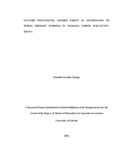| dc.description.abstract | This study was to investigate the factors influencing gender parity in governance of public primary schools in Tharaka North Sub-County, Kenya. The study objectives sought to determine the extent to which educational qualifications, self-perception, gender stereotypes, education and redress mechanisms influence gender parity in governance of public schools in Tharaka North Sub-county. The study was guided by the Equity Theory proposed by John Stacey Adams. Descriptive survey design was used for the study. Stratified sampling was used to sample schools based on their zonal educational distribution to participate in the study. The schools were divided into strata based on the four educational zones to ensure equal representation of each region. Data was collected using questionnaires for Head teachers and teachers, interview schedules on Sub County Director of Education, Sub County Quality Assurance and Standards Officer and Sub County Human Resource Officer. Data was analyzed through aided by SPSS. Quantitative data was coded and analyzed using descriptive statistics. Frequency distribution tables, pie charts and bar graphs were used to present data. The study revealed that female teachers had the required academic qualifications. Upon consideration of qualification against gender and positions of leadership, women were the majority, most qualified and experienced, yet the males held most positions of governance in the public primary schools in Tharaka North sub-county. Majority of the respondents (80%) agreed and strongly agreed that women had succumbed to the male dominance and settled for the second class. The study revealed that majority of female teachers (52.5%) applies for governance positions in the ministry of education specifically to be head teachers and deputy head teachers. Every year they apply for such positions with hopes of being promoted. This was a good indicator that female teachers have high self esteem when it comes to the hopes of career progression. The study revealed that the ministry and officers promoting teachers were gender biased in offering the opportunities and elevating teachers to the positions of leadership. On the basis of the findings, the study recommended that; Feminist organizations and the Ministry of gender should collaborate with the Ministry of Education in empowering female teachers to attain more in-service training so as to continue maintain their level of education with their male counterparts. Finally, the researcher proposes the following; a similar study is recommended in other sub-counties of the county to assess the generalizability of the study findings. This should also include a comparison of urban and rural primary schools | en_US |



